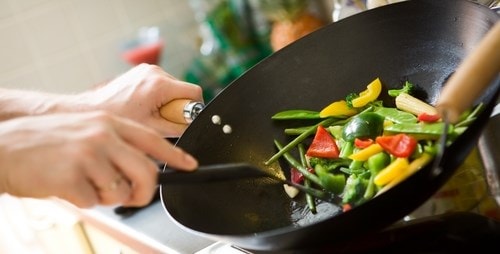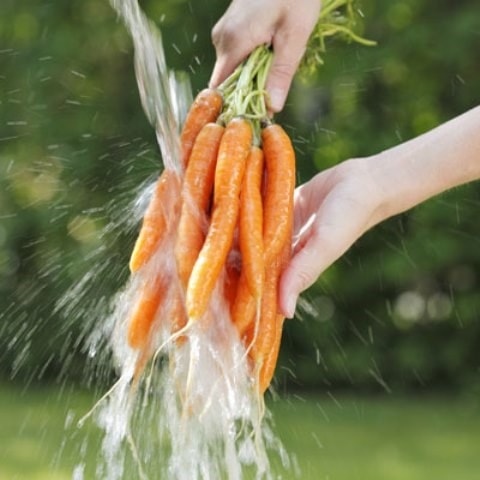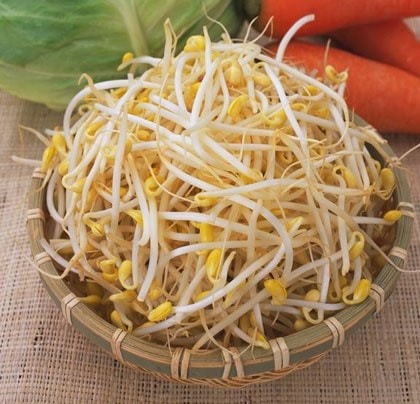Stir-frying and eating green vegetables: Serious mistakes
According to nutritionists, green vegetables and fruits provide many vitamins necessary for the body's development.
However, due to some unscientific vegetable processing habits, chefs can lose a lot of nutrients during the cooking process.
 |
1. Green vegetables stored for a long time
To save time, many people, especially office workers, often only go to the market once a week, buy all kinds of food and vegetables to "stock" in the refrigerator. Doing so is of course very convenient, can save time, but do not know that the longer green vegetables are left, the more nutrients they lose.
For example, vegetables rich in vitamin C such as spinach and mustard greens will lose 84% of their vitamin C if left at 20oC for 1 day. If it is necessary to “store” them, they should be kept in a dry, cool place and out of the sun.
2. Cooking time is too long
Vitamins in vegetables are very "sensitive", if cooked over low heat for a long time, they are easily decomposed. Therefore, nutritionists advise that the cooking time of vegetables should not be prolonged, it is best to cook over high heat and not add too much water to minimize vitamin loss.
3. Do not cook vegetables immediately after cutting them.
Most of the vitamins in vegetables are in a "volatile" state. Therefore, after cutting vegetables, do not cook them immediately but leave them for a long time, most of the vitamins will be oxidized.
4. Pick off the vegetable leaves
Some housewives have the habit of picking off the leaves when processing water spinach, water mimosa... This is a mistake and a waste because the amount of vitamins in the leaves, stems and stalks are the same.
5. Eat only the flesh, discard the juice.
When stir-frying vegetables, most of the nutrients in the vegetables are "dissolved" into the water, it would be a pity not to drink it.
6. Blanch vegetables before cooking for safety
Master Nguyen My Linh, Department of Vegetables and Spices, Vietnam Fruit and Vegetable Research Institute, said that the habit of washing and blanching vegetables before cooking to ensure hygiene and beautiful color when eaten is unnecessary, even wasteful. This blanching method not only reduces vitamins but also destroys substances that help prevent cancer in vegetables.
7. Wash vegetables 3 times and they are clean.
 |
According to Dr. Phan Thanh Tam, Department of Food Technology - Post-harvest, Institute of Food Biotechnology, Hanoi University of Science and Technology: If you think that just picking clean vegetables and rinsing them 3 times in a basin can remove all dirt and bacteria in vegetables and fruits, you are completely wrong.
With that washing method, it is difficult to remove all dirt, dirt, parasites, microorganisms and chemical compounds such as pesticides, plant protection drugs... that are invisible to the naked eye.
8. Cut vegetables first, then wash them.
It is best to wash vegetables before cutting them, this will ensure that the vitamins are still intact. According to research, vitamins in vegetables are usually in liquid form, so if you cut vegetables and then wash them, you will accidentally "wash" away a large amount of vitamins.
9. Peel all vegetables
Many people think that vegetable peels are the part that comes into contact with dirty soil, so they should be peeled off. However, according to nutritionists, there are some fresh vegetables whose peels contain more vitamin C than the stems and leaves.
For example, pumpkin, radish, carrot, eggplant... Therefore, housewives are advised that, except for vegetables with hard skin that cannot be cooked until soft, they should not peel all the skin off the vegetables, just wash them thoroughly before processing.
10. Use low heat to stir-fry vegetables
Vitamin C and B1 are both “afraid” of heat, so when stir-frying vegetables, you should not use low heat, but turn up the heat to high. Also, adding a little vinegar to the vegetables will help retain more vitamins.
11. Don't eat immediately after cooking.
The habit of soaking vegetables after turning off the stove will cause a large amount of nutrients to be lost. Therefore, after the dish is cooked, it should be put on a plate to "eat" immediately.
12. Eat salads and raw vegetables regularly
Salad is a vegetable dish that is not cooked at high temperatures, if the pesticide residue is too high, it will be extremely harmful to the body. Therefore, when eating salad or raw vegetables, it is best to choose uncontaminated green vegetables or organic vegetables, and at the same time, note that you should not eat too much.
13. Eat tomatoes before meals
Tomatoes should be eaten after meals. This can cause stomach acid to combine with food to reduce acid concentration, avoiding increased stomach pressure leading to stomach expansion, which can easily cause symptoms such as stomach pain, stomach discomfort, etc.
14. Wash the mushrooms too clean or soak them in water
Shiitake mushrooms contain ergosterol, which converts into vitamin D after receiving sunlight. However, if you wash them too thoroughly or soak them in water for too long before eating, they will lose a lot of their nutrients. When cooking shiitake mushrooms, you should not use iron or copper pots to avoid losing nutrients.
15. Eat raw bitter melon
The bitter oxalic acid in bitter melon can hinder the absorption of calcium in food. Therefore, before eating bitter melon, it must be boiled in boiling water to remove oxalic acid. In particular, young children who need to supplement a lot of calcium should not eat too much bitter melon.
16. Eating too much spinach
Spinach contains a large amount of oxalic acid, should not eat too much. Oxalic acid in the body will combine with calcium and zinc to create calcium oxalate and zincoxalatedihydrate, which are not easily absorbed and excreted, affecting the absorption of calcium and zinc in the intestines, easily causing calcium deficiency, zinc deficiency in children, leading to poor bone and tooth development, also affecting brain development.
17. Eat lots of raw bean sprouts
 |
Bean sprouts are delicious, nutritious, and rich in nutrients, but they must be cooked when eaten. If eaten raw, do not eat too much. Eating a lot of raw bean sprouts can easily cause unpleasant symptoms such as nausea, diarrhea, dizziness, etc.
18. Store cooked leeks until the next day
Leeks left overnight will become toxic. It is best to eat them immediately after cooking, and not to store them for too long. If left for too long, the nitrate in them will turn into nitrite, causing poisoning. In addition, children with poor digestion should not eat leeks.
19. Overcooking vegetables
When preparing green leafy vegetables, do not cook them for too long. Otherwise, nitrates will turn into nitrites, which can easily cause food poisoning in children. In particular, frozen vegetables should not be cooked for too long, otherwise they will lose a lot of nutrients.
According to suckhoedoisong






